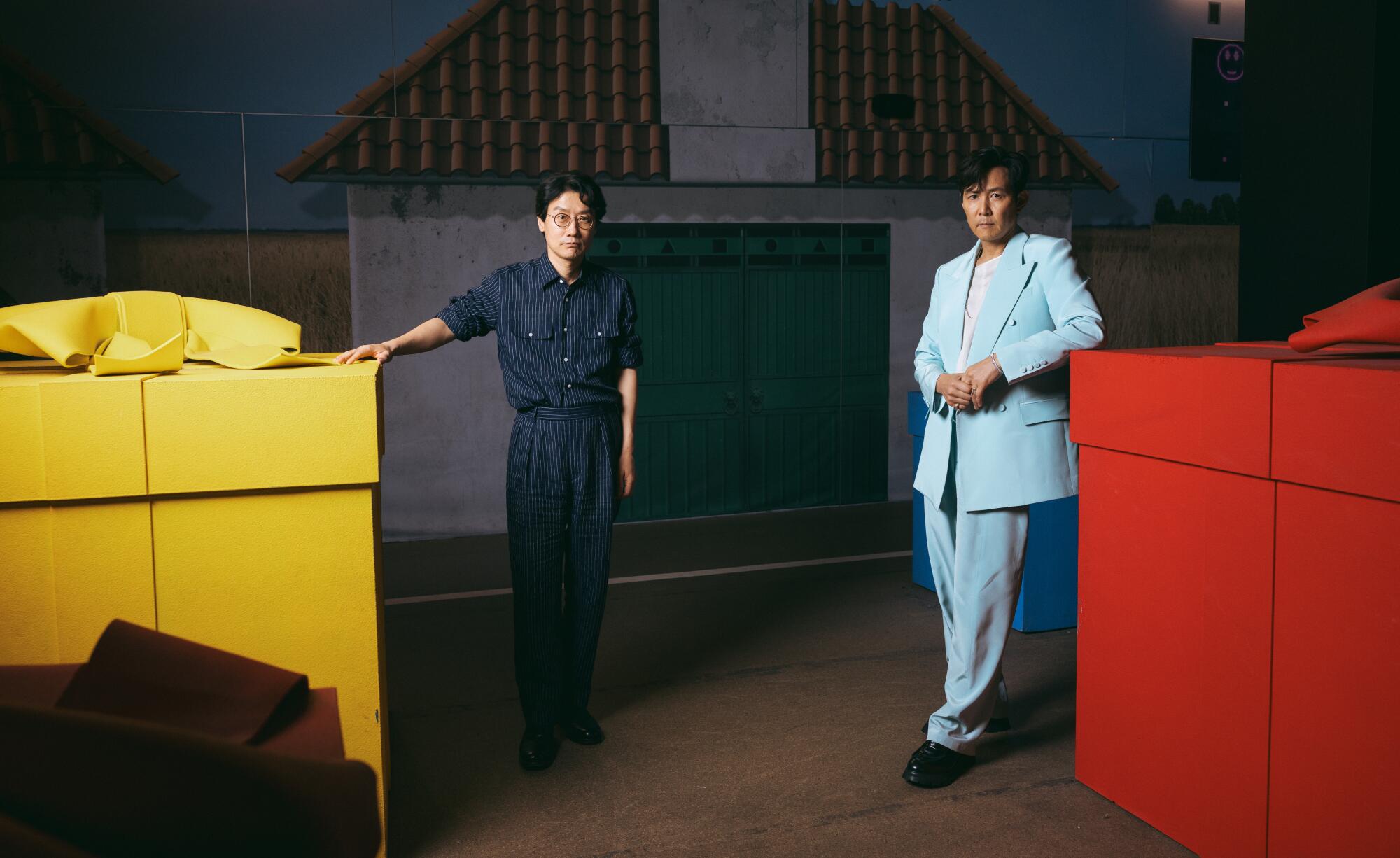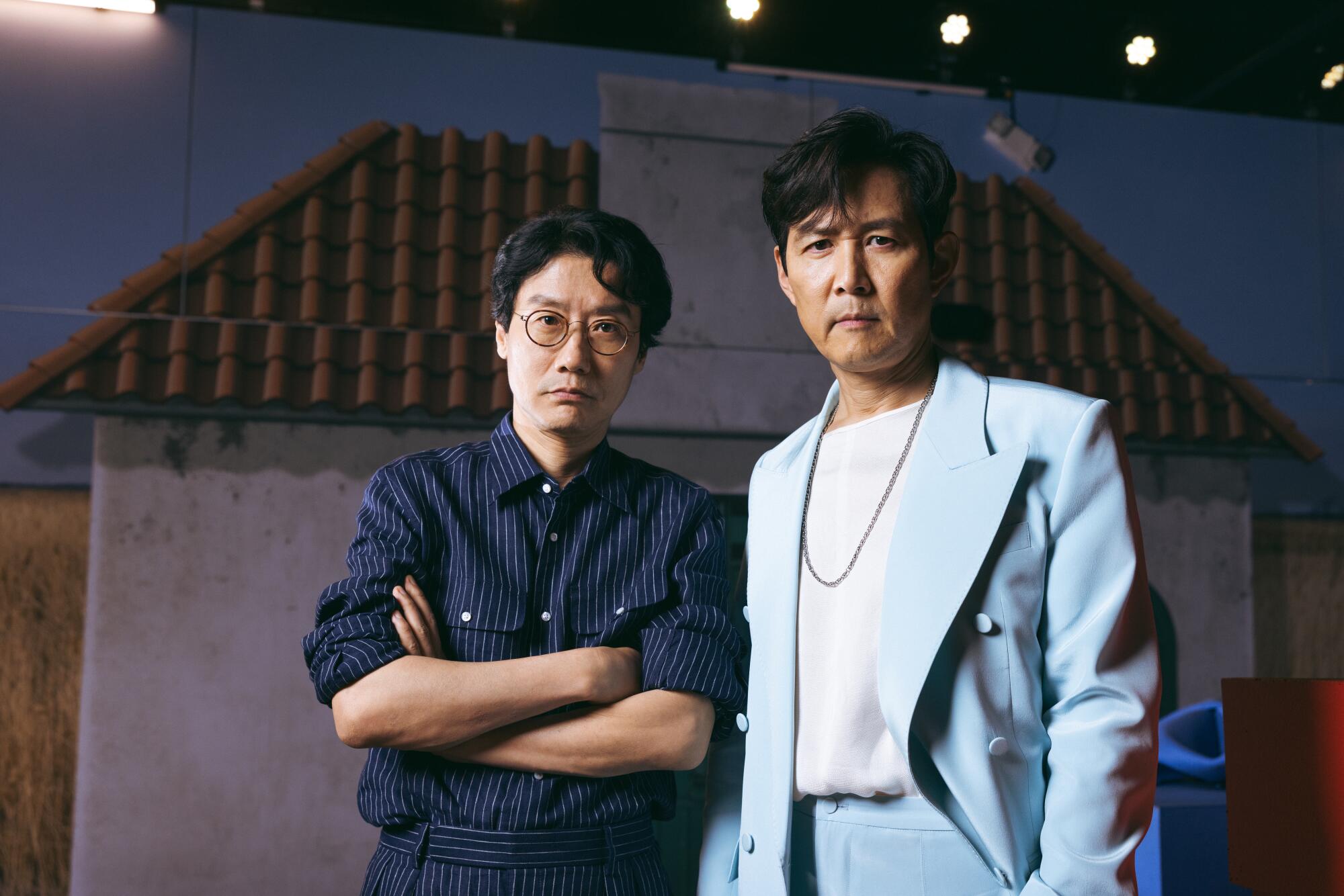
- Share via
This article contains many spoilers for Season 3 of Netflix’s “Squid Game.”
“Squid Game” is a twisty, twisted thriller, with ordinary, financially stressed people playing children’s games to the death for the amusement of the hidden wealthy. Beneath that surface, creator, writer and director Hwang Dong-hyuk has been embedding sociopolitical commentary amid the shock and awe of protagonist Gi-hun’s (Lee Jung-jae) personal roller-coaster ride; the characters’ desperation as the saga ends forces those messages to poke through the slick, candy-colored exterior.
“It was a result of elevation of the themes and stories,” said Hwang of those ideas becoming more clearly voiced. They “became more upfront and intense just as a natural course of the story unfolding.”
The global phenomenon, still Netflix’s most-watched non-English show ever (its first two seasons are No. 1 and 2 on the streamer’s all-time list, with nearly 600 million views to date, according to Netflix), ends on its own terms with the release of its third and final season Friday. And what an arc everyman Gi-hun will have completed. How better to represent Hwang’s themes of end-stage, winners-and-losers capitalism, with its warping, destructive power, and how the ill-intentioned can exploit democracy’s flaws, than to depict an ordinary person buffeted by the unseen hand of pain for profit?
“You can say this is a story of those who have become losers of the game, and also those of us who are shaken to our core because of the chaotic political landscape,” said Hwang, who with Lee, spoke via an interpreter on a video call earlier this month from New York. “I wanted to focus in Season 3 on how in this world, where incessant greed is always fueled, it’s like a jungle — the strong eating the weak, where people climb higher by stepping on other people’s heads.”

Gi-hun’s hands become bloodied in the competition in Season 3, Hwang said. “That’s the first time he kills someone [in the games]. This person who symbolized goodness, the original sin is now on him because of what society has done to him,” he said. “How does he pick himself up from that? That’s the heart of Season 3. In a way, we’re all put in this situation due to the capitalist society and chaotic political situation. Gi-hun symbolizes what all of us go through these days.”
When we meet him in Season 1, Gi-hun is down and out, an inveterate gambler. Through Season 1’s horrific gantlet of murderous kids’ games, his exterior is scraped away with a rusty edge until all that’s left is a flawed but good man. Gi-hun is someone who sees what he believes with clarity, while becoming the suddenly rich champion of the games.
Writer-director Hwang Dong-hyuk and star Lee Jung-jae reveal that the main character’s next journey will be less about survival and more about justice.
But after he reaches that peak, Season 2 plunges him back down the roller coaster as he becomes obsessed with vengeance against the elite voyeurs who fund the game and the Front Man (Lee Byung-hun), who oversees it. Righteous anger carries Gi-hun to the brink of his goal of destroying the games, only to see it all brutally dashed. Season 3 finds him a broken man, near catatonic with guilt. Without him to guide the less bloodthirsty players, the games will enter a fearsome phase of all-out mayhem, from which unexpectedly emerges a chance at redemption for the battered protagonist.
“All of those changes within Gi-hun are depicted in such minute detail” in Hwang’s writing, said Lee, “so nuanced and with so many layers. You’ll see Gi-hun have a change of heart. Sometimes his beliefs will be shaken. But despite all of that, he will continue to struggle to find hope and his will.

“All I can say is, I’m a very lucky man. You don’t come by characters like Gi-hun every day. It’s been a true honor,” he adds.
Lee’s public appearances in support of “Squid Game” have provided an almost comic contrast with Gi-hun. He’s movie-star handsome, elegant, always sharply dressed. On the show, especially as Gi-hun deteriorates in Season 3, he’s wrecked.
“Jung-jae went on this extremely harsh diet for over a year so he could really portray, externally, the pain and the brokenness, to really express how famished and barren he is, both mentally and physically,” Hwang said.
The hit Korean Netflix series returns, picking up where things left off in Season 1, with Seong Gi-hun (Lee Jung-jae) ready to destroy the game once and for all.
Gi-hun isn’t the only person the games destroy. Another hallmark of the show is its deft development of characters into fan favorites, coupled with its “Game of Thrones”-like willingness to unceremoniously kill them. Viewers will be sharpening their pitchforks when trans commando Hyun-ju (Park Sung-hoon), a.k.a. Player 120, dies ignominiously in Season 3. Hwang is already braced for the backlash.
“It’s not me who did it! It was 333,” he exclaimed, blaming the murderer.
Hwang said when he watched the first assembly edit of that death, “I wrote and directed and everything, I knew it’s coming, but it was still painful. It was like, ‘Oh, come on, come on.’ ”
“For some characters, I would see them go and I’d feel really sad … I would think, ‘Director Hwang is such a cruel man,’” Lee said.


1. Hyun-ju (Park Sung-hoon) in Season 3 of “Squid Game.” “I wrote and directed and everything, I knew it’s coming, but it was still painful,” Hwang Dong-hyuk said. 2. Jun-hee (Jo Yu-ri), a pregnant contestant in the games, was another casualty. (No Ju-han / Netflix)
When Hwang asks what death in particular made him feel that way, Lee doesn’t hesitate to cite another beloved character, pregnant contestant Jun-hee (Jo Yu-ri), calling that Season 3 death “heartbreaking.”
Lee’s sensitive, evolving turn as Gi-hun — deeply human amid the madness, paranoia and murder set in bright green and pink surroundings — has made the character the ideal litmus test for Hwang’s critique of an economic system designed to produce titanic winners and losers who face annihilation. He’s a living symbol of Hwang’s themes.
“I feel like Director Hwang is truly an artist,” Lee said. “I mean something akin to a concept artist. Because when he creates his visuals, not only are they extremely pleasing to the eye; he focuses on the meaning behind them. He [stacks] images on top of one another, almost as if building a Lego castle. Each little block has meaning: each dialogue, each editing flow and [each use of] the musical score.”
As Season 3 reaches a boil, some of Hwang’s symbolism becomes less subtle. In one game, contestants clutch keys suspiciously resembling crucifixes as one player leads others with fervor, for better or worse. One character’s moment of triumph occurs before a painted rainbow (rainbow flags are also associated with the LGBTQ+ community in Korea). And Hwang’s nuanced critique of democracy comes to the fore.

Unlike Season 1, in which contestants had one chance to vote to end the games, in Seasons 2 and 3, votes are taken after each contest; as more players die, the pot swells larger and larger. With only a score or so of participants left, a vote to quit means all would leave alive, and with substantial cash. Voting to continue means, explicitly, they will kill to become obscenely wealthy.
“In the past, at the time of elections, despite our differences, we all came together; there was more tolerance through the process of conflict,” Hwang said. “I don’t think that is anymore the case. Rather, elections [have only driven] societies into greater divides. I wanted to explore those themes in Seasons 2 and 3; that’s why I included the voting in each round.”
Hwang loudly calls out the flaw of democracy that allows the barest of majorities to subject all to nightmarish policies — even more nightmarish for those who voted against them. The ruthless winners keep reminding the others in Season 3 it was a “free and democratic vote.”
“That is not to say that I have a different answer,” he said. “I wanted to raise the question because I believe it is time for us to try to find the answer. In Season 1, I looked at the flaws of the economic system that creates so many losers due to this unlimited competition. In Season 2, I depicted the failure of the political system.
“Coming into Season 3, because the economic system has failed us, politics have failed us, it seems like we have no hope,” Hwang added. “What hope do we have as a human race when we can no longer control our own greed? I wanted to explore that. And in particular, I wanted to [pose] that question to myself.”
And what has he found? Does he still believe in humanity?
“Well, I don’t have the answer,” Hwang said. “But I have to admit, honestly, I think I’ve become more cynical, working on ‘Squid Game.’”
More to Read
The complete guide to home viewing
Get Screen Gab for everything about the TV shows and streaming movies everyone’s talking about.
You may occasionally receive promotional content from the Los Angeles Times.









